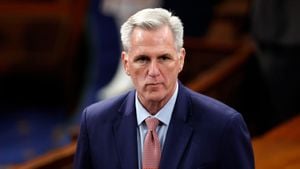Ford Motor Company has made headlines recently with the announcement of significant job cuts as it grapples with challenges posed by lower demand for passenger vehicles. The automaker plans to eliminate 4,800 jobs across its operations in Germany and the United Kingdom, translating to approximately 14% of its total workforce. This move reflects broader struggles faced by Ford within the European market as it tries to navigate shifting consumer preferences and increasing competition.
The decision to lay off such a large number of employees hasn't come lightly. Factors like changing trends toward electric vehicles (EVs) and financial pressures have led Ford to reassess its strategy. The company has encountered growing pains as it tries to adapt to the demands of modern consumers who are veering more toward electric and hybrid vehicles rather than traditional passenger cars.
The impact of the layoffs will predominantly be felt within the company’s operations related to passenger vehicles, as Ford's once-strong foothold is gradually eroding. This shift has forced many iconic manufacturers, including Ford, to pivot their focus and resources. Company executives have hinted at plans to restructure and focus instead on electric models, which require less labor and help reduce costs.
The automotive industry has recently been marked by significant transformations as manufacturers feel compelled to invest heavily in EVs and new technologies. This trend has seen many companies driving toward digitization and automation to streamline processes and meeting the growing demand for greener options.
Ford's job cuts are not isolated; they reflect systemic challenges fueling layoffs across the entire industry. Major players are facing similar dilemmas, with many automakers evaluating their workforce requirements as they transition to electric vehicle production lines.
To add to Ford's woes, sales of traditional passenger vehicles are decreasing, and this trend shows no signs of changing soon. The concerns over whether the cuts will be enough to allow Ford to regain its footing have made industry watchers anxious. Some experts argue more drastic measures may be required to realign the company’s focus, especially considering the fierce competition from both established carmakers and new entrants to the electric vehicle market.
Leading the charge toward electrification, Ford has recently announced ambitious plans for its EV portfolio, hoping to solidify its place among top competitors. The company has committed billions to ramp up its manufacturing capabilities for electric vehicles. Yet, the challenge remains substantial, especially with the current labor force adjustments.
The cultural and economic impact of job cuts within Ford cannot be overlooked. Communities relying on Ford’s production plants are facing uncertainty as livelihoods hang precariously on the company’s ability to rebound. For employees, the layoffs signal instability amid what was once perceived as secure employment within the automotive sector.
Ford is doubling down on its efforts toward recovery and growth, believing the future still holds promise within the electric vehicle sector. Despite these job cuts, the company remains committed to developing its product lines for greener transportation solutions.
Many current and former employees have voiced their concerns over the layoffs and company direction. They fear for the long-term viability of Ford as it attempts to balance cost reductions with the imperative to innovate and evolve.
Experts suggest it’s imperative for Ford to stabilize its operations as it navigate this transitional period. The need for solid leadership to steer the company forward is not only desirable but necessary. With the right approach, Ford could emerge from these tumultuous changes with renewed strength to face the electric future.
While the ramifications of these layoffs will likely linger, Ford's efforts to embrace and promote electric vehicles may signal the start of a broader transformation across the auto industry. The balance between reining in costs and driving forward with innovation will undoubtedly shape the future path for Ford and the automotive market as it confronts new realities.



